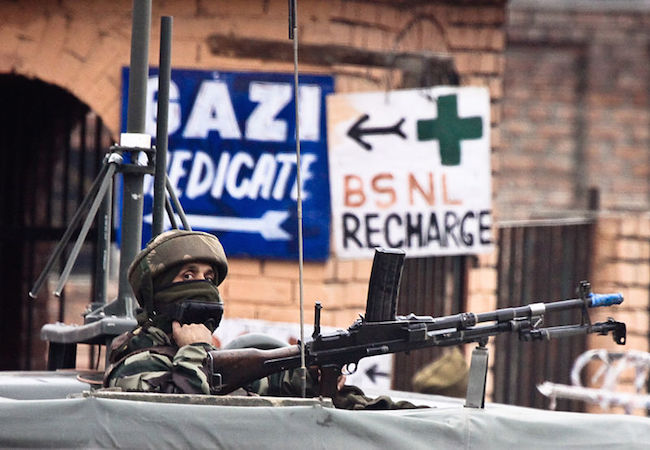The ‘high-risk low-gain’ politics of the Kashmir issue

By M Waqas Jan
Over the last few days, Pakistan’s Prime Minister Imran Khan seems to have come under tremendous fire for his recent statements regarding a possible future settlement with India over Kashmir. Speaking to a group of foreign journalists, Mr. Khan had stated that he might have a better chance of reaching an agreement with Mr. Modi if his right-wing Bharatiya Janata Party were voted to power in the ongoing elections in India. This he predicted would be better than dealing with the struggling Congress Party which may lack the political capital to cooperate with Pakistan, out of fear of alienating India’s influential far-right.
Considered by many as a blatant endorsement of Mr. Modi and his more oppressive brand of politics, Mr. Khan has since taken considerable flak from his political opponents as well as from some prominent voices within Pakistan’s mainstream media. These include former diplomat Senator Sherry Rehman who has vehemently criticized the PM’s statement. Her position is that Pakistan instead of appearing to favor certain individuals should focus on dealing with the Indian state as a whole. Particularly with respect to the Kashmir issue, she pointed out that favoring one individual or party over the other not only amounts to interference, but denigrates and shuns other parties from any future diplomatic efforts as well.
The Senator does have a point. Picking favorites and potential negotiation partners before the Indian elections even start does amount to a diplomatic faux pas of sorts. However, if one was to simply consider the PM’s statement on its own merits, all he did was state a harsh, albeit long-standing political reality that has persistently characterized both countries’ relationship with one another. Particularly with respect to the politics and discourse surrounding the Kashmir issue, this reality has been referred to by renowned South Asian expert Stephen P. Cohen as the ‘high risk low gain’ nature of cooperation that exists between both countries.
This idea of the high-risk low-gain nature of Pak-India relations is based on the fact that any form of cooperation between both countries has historically remained fraught with risks, particularly within the realm of local politics. This idea that leaders on both sides of the border have often more to lose than to gain politically has been evident throughout both countries’ histories; especially when calling for greater cooperation.
For instance, these same risks were evident on both sides during Mr. Modi’s impromptu visit to Pakistan in late 2015. Building on the budding bonhomie between himself and former Prime Minister Nawaz Sharif, both leaders had highlighted their growing personal relationship as highly positive for India Pakistan relations. This was despite the criticisms both were facing for appearing too conciliatory and overeager to paper over long standing issues. However, the risk of appearing weak or ceding more than necessary was ultimately greater for an already weakened Nawaz Sharif. Already dogged by the increasingly tenuous relationship between himself and the military establishment, Mr. Sharif instead of gaining any ground towards a workable solution with India, found himself even more politically alienated as a result of his overtures.
The same was the case in the Musharraf era as well. At the height of his power in 2001 and immune to the political risks of civilian leaders, Mr. Musharraf appeared more than willing at the Agra summit to reach a workable solution. His proposed solution however remained untenable for Indian leaders such as L.K Advani, who found the risks of appearing reconciled with the Pakistani General as too great. Six years later, the four point plan which Mr. Musharraf had developed over years of back-channel talks with Mr. Manmohan Singh’s government, also fell through as Mr. Musharraf’s political troubles at home started to take toll. The growing uncertainty over Mr. Musharraf’s political future further compounded the risks being faced by Indian leaders in late 2007, at a time when the Kashmir issue was according to many ‘all but resolved’.
Even more ironic perhaps was the lost opportunity for India at Simla in 1972, where Shrimati Indira Gandhi Ji at the height of her power remained a hair short of finalizing the Kashmir issue with a militarily defeated Mr. Bhutto. As the controversial story goes, a verbal agreement between Mr. Bhutto and Mrs. Gandhi just fell short of being written down and signed due to Mr. Bhutto’s insistence. He had reportedly asked for more time as the political risks for reaching a final settlement over Kashmir were far too great for him then.
Coming back to Mr. Imran Khan’s most recent statement, his prediction of a weakened Congress party being less able to face such risks can be termed as a candid summation of the above historical lessons. Not to mention the risks Mr. Khan himself faces to his own political capital, when calling for cooperation with a jingoistic and war-mongering BJP government. A BJP government, which thus despite its highly questionable sincerity to peace, may still yet offer a more pragmatic chance of cooperation over Kashmir. Yet, in staying true to the irony that has long plagued India -Pakistan relations, both Mr. Khan and Mr. Modi are neither the first, nor likely the last leaders to face the high risk low-gain implications of calling for peace and reconciliation between Pakistan and India. Unless there is widespread political consensus on an honest and stringent commitment to peace and reconciliation on both sides of the border, that elusive peace sought by a few idealists is likely to remain just that; an elusive ideal.




